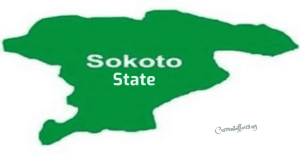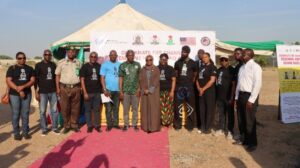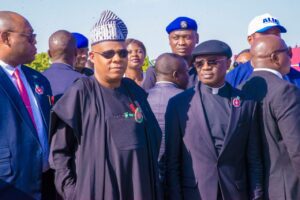Kaduna government harps on improved healthcare facilities for citizens
By Austine Emmanuel, Kaduna
The Kaduna state government has put up measures to ensure the delivery of quality healthcare services in the state for the collective good of its citizenry.
The Director General, Kaduna State Contributory Health Management Authority, (KADCHMA) Mallam Abubakar Hassan, made this known in Kaduna on Wednesday, during an engagement meeting with leadership of traditional and religious institutions on Kaduna state contributory health scheme.
According to Hassan, Kaduna State government recognises the importance of healthcare delivery in building its human capital and has taken steps to ensure that every citizen has access to affordable and high-quality healthcare services.
He disclosed that amongst steps taken is the establishment of KADCHMA, adding that the Authority oversees a health insurance scheme that provides financial risk protection to the residents of Kaduna State.
He said, “We are gathered here, to not only remind ourselves of our mission but also, to engage in a meaningful dialogue with our valued stakeholders, if we are to succeed in our task of promoting universal health coverage in the state.
“In this regard, the position of religious and traditional leaders cannot be overstated. Equally important is the collaborative effort of relevant government agencies, healthcare providers, community leaders, civil society organizations, and, most importantly, the beneficiaries themselves.
“Today, our advocacy focuses on our religious leaders and traditional rulers. We believe that they are in good positions to deepen understanding of the activities of KADCHMA and the health insurance scheme being run by the state government.
“We are particularly concerned that the informal sector has not embraced the scheme with all the benefits that are accrued to enrollees. At present, just about 1 percent of those who have enrolled in the insurance scheme are from the informal sector. It is the formal sector that has supplied the bulk of the enrollees.
“This should not be the case. The market woman, the plumber, mason, mechanic, farmer and carpenter, to mention a few informal sector business persons, can also be enrolled in the scheme. The idea is to plan for the future as it can help you get the medical care you need for a token that you would have earlier deposited and supplemented by the government without having to worry about the high costs of healthcare services as at the time of your need.”
In her remarks, the Honourable Commissioner for Health, Kaduna state, Hajiya Umma Kaltume Ahmed, said the program is apt even as it involves key stakeholders that cut across various religious and traditional leaders who are critical in sensitising their people at the grassroot.
The Commissioner, who was represented by the State’s Director Admin and Finance, Ministry of Health, Dr. Zakari Mohammed, said the state government is looking forward to a situation where no resident will become poor as a result of paying for healthcare service for his family and no human life in Kaduna state is lost because the individual cannot be able to afford quality health care service at the point of care.
She said, “As you are all aware, the state government conceived the idea of establishing the authority to provide access to quality and affordable healthcare services with financial risk protection to all residents of the state.”
“The scheme is a safety net especially to the vulnerable population against the catastrophic and impoverishing effect of paying out of pocket for health care services.
“The Kaduna state government is looking forward to a situation where no resident will become poor as a result of paying for health care service for his family and no human life in Kaduna state is lost because the individual cannot afford quality health care service at the point of care.”
“According to the World Health Organisation, (WHO) universal health coverage means that all individuals and communities receive the health services they need without suffering financial hardship.
“I want to use this opportunity to make a passionate appeal to our traditional and religious institutions in the state to assist the state government towards the accomplishment of the noble objective.
“These two institutions are the closest to the people and one of the strongest pillars of governance. They are considered as strong platforms to advocate for increased attendance of citizens at the grassroot to access healthcare services through the contributory health insurance where the disease burden is at the highest.”




